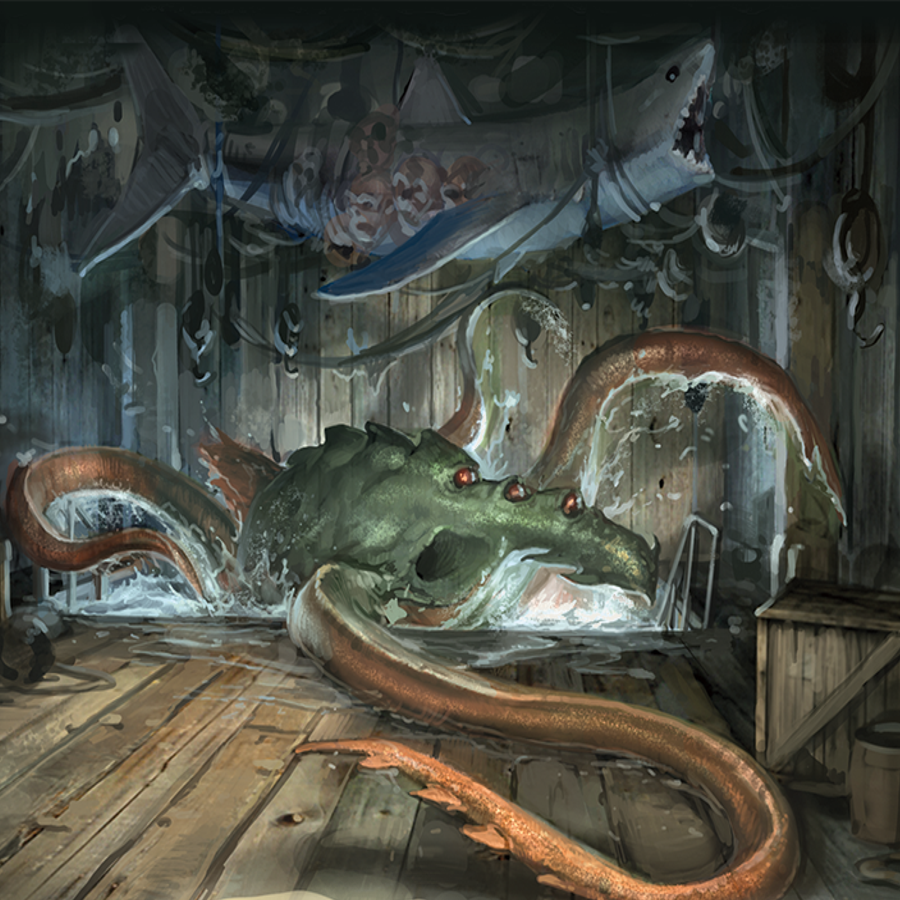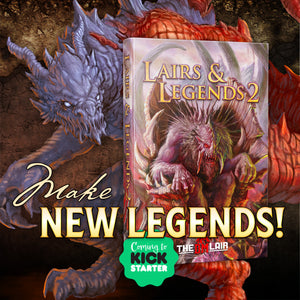Top 10 Worst D&D House Rules Ever

Written by Luke Hart
Today, we’re going to go over the top 10 absolute worst house rules in Dungeons & Dragons. See, I have an entire video series on house rules, and I thought that it might also be valuable to go over the things dungeon masters should consider not doing—because avoiding pitfalls is important, too.
Now, this list will include things that I personally have experienced as a player. However, I also pinged everyone in my community tab about the worst house rules they’ve experienced. So, I’ve included some particularly juicy—that is, horrendous—house rules from there, too.
By the way, running awesome 5e games with in-depth lore, deadly traps, and terrifying monsters doesn’t have to take hours of prep! My team and I published Lairs & Legends 2 and Loot & Lore 2 to give you everything you need. Hand-crafted by a team of professional game masters to make it as easy to use as possible, these two books are an anthology of game master resources to fuel your games for years to come.
Watch the video for this article below.
1. Critical Fumbles on a Natural 1 Attack Roll
Holy crap, it is amazing how much players hate, hate, hate critical fumbles. It doesn’t matter if you are using a stupid table to look up results or saying dumb stuff like “Your weapon flies out of your hand” or “Your weapon breaks.”
Yeah, let’s find a way to unevenly punish melee players over spellcaster players and unevenly punish the players (who usually get more attacks) over the enemies—not to mention how much it bogs the game down by having to roll on the tables and determine results.
I personally have never had players who enjoyed critical fumbles. In my experience, they are nearly universally hated by players. I did use them several years ago in my Sword Coast Guard game, and they didn’t last but three sessions before it became clear that we all hated them.
2. Re-rolling Your Character at Level 1 When They Die
Okay, look, dying and having to re-roll a character sucks enough for players. Many players just don’t like it. It is merely adding insult to injury to make them re-roll their level 16 character at level 1.
Now I get that this may be the old-school, gritty way of doing things. That’s great, and I can appreciate nostalgia about how folks used to do things back in the day as much as the next person. But I feel like today’s players may be just a wee bit different.
So if I die, I can live with that—I personally don’t mind it when my PC dies because it’s an opportunity for me to try out a different cool build I might have in mind—but please don’t make me start at level 1 again. It sucks for lots of actual game reasons, not just because I’m a special snowflake or something.
3. Screwing with the Experience Points System in Ways That Make It Unbalanced for Players
For instance, the worst way to tweak the XP system is to only award XP to the character who dealt the killing blow. So, that crowd-control wizard who makes your battles a crap ton easier via hold monster or hypnotic pattern or banishment or any number of amazing spells but rarely kills anything just gets the shaft?
Or just awarding experience points randomly or at the dungeon master’s discretion, often favoring certain players. Oh, the dungeon master is a thespian themselves and gives more XP to players who exhibit the same behavior? Or the DM loves combat and gives more XP to players who excel in that area.
No—pass, please. How about we don’t make D&D a competition between players, huh? Seriously, one of the things that distinguishes D&D from other table-top role-playing games and is a huge compelling gameplay component is that the players don’t compete with each other. Let’s not ruin that, shall we?
4. Permanent Injury Tables Triggered by Critical Hits or Similar Game Mechanics
Argh! These things are horrible, especially the ones in the Dungeon Master’s Guide. I mean, some of these injuries are so bad that you might as well just re-roll your character. A lost arm? A reduction to the bard’s charisma score? A permanent limp, reducing movement? I’m sorry, that stuff is crap.
5. Punishments for Not Roleplaying Your Alignment “Properly”
Come on. Let’s take one of the most contentious topics of D&D and weaponize it. Yeah, that’s great. I’m sure that will be fun.
What am I talking about? Well, the fact that almost no one can agree on what defines any particular alignment. That is, most folks have a different idea of what things like lawful good and chaotic good even mean. So, the chances are very high a dungeon master will have a different understanding of alignment than their players. And if in-game punishments are involved for not roleplaying your alignment, then players will usually end up screwed.
Either they get punished with loss of experience points or something similar, or they are forced to roleplay their character according to the DM’s definition of alignment. That effectively steals player agency—something I’ve stated before as something a dungeon master should avoid doing at all costs.
6. House Rules That Nerf Class Abilities or Core Game Mechanics
Now look, I’ll be the first to admit to being guilty of doing this—I know. However, I always strive to discuss these sorts of changes with my players first and then only change things when absolutely necessary.
For instance, my players and I have spoken about the spell Healing Spirit, and we universally agree that it’s horribly overpowered as written. The feat Elven Accuracy is another example.
The problem, as I see it, is when dungeon masters nerf things due to a lack of understanding of game mechanics or because they just don’t like them—particularly when they nerf things without first discussing what they perceive as the issue with their players. It’s always best to talk to players and see if you can reach a mutual agreement.
7. Rolling Ability Scores in Order
So, your first roll is your Strength, the second roll is your Dexterity, and so on. Now, I personally don’t have quite as high an aversion to this idea as others, but I do know that many, many players hate this.
Now, some dungeon masters will say that this will encourage your players to play classes that they ordinarily wouldn’t play. They may also appeal to nostalgia how back in the day this is how it was done.
You may have noticed this, but in general, I hate appealing to nostalgia just for nostalgia’s sake. Like, convince me with logical arguments and facts, not just some flighty “Well back in the day” statement. I mean, back in the day thousands of people died from polio every year, but none of us want that again, do we?
Anyway, the main problem with this house rule is that it prevents players from playing characters they actually want to play. Oh, you wanted to be a ranged fighter or a rogue? Tough luck. Your Dexterity is 8. And, you know what? Most players just don’t find that to be much fun.
8. Skill Checks Auto-succeed on Natural 20s
So, I suspect that, in part, this exists not because DMs make it a house rule but because they simply don’t understand the actual game rules. Only attack rolls are auto-success on natural 20s, not ability or skill checks.
Rolling a natural 20 on a Persuasion check will not allow me to convince the king to abdicate his throne, and rolling a natural 20 on a Stealth check will not allow me to hide from an enemy who’s staring directly at me while I have faerie fire outlining my form.
If an Arcana check DC is 25, the barbarian doesn’t magically know the secrets of arcane runes because they got lucky on a 5% chance. Simply put, some things are just not possible.
9. Any House Rule That Allows the Dungeon Master to Take Away Player Agency
I know this is a loose grouping rather than a specific rule, but I hear about lots of these. And, usually, they are made up on the spot by a capricious DM who just doesn’t like something—for instance, a dungeon master overruling a player’s actions because “That’s not what your character would do.” Who exactly should be the judge of what a player’s character would or would not do if not the player themselves?
10. Any House Rule That Only Favors the Enemies
For instance, ruling that enemies get infinite reactions to use on attacks of opportunity, but that players don’t get the same. The rule of thumb I follow in my games is that if it works for the dungeon master, it works for the players—and vice versa.
The Definitive 5e GM Resource Anthology!
Lairs & Legends 2 and Loot & Lore 2 are the ultimate 5e game master resource! These two massive books put an anthology of everything you need to run amazing games for YEARS at your fingertips.
- Over 30 Adventures
- 30 Stand-Alone Encounters
- More than 100 Monsters
- 6 New Rule Sets
- And much more!
These books are written to make running the game easy for new and veteran GMs. Each resource is built with intuitive formatting, clear wording, and evocative art. You’ll never again have to dig through dense paragraphs to find critical details you need during a live session.
These 5e resources are designed to scale to your needs; whether it’s a quick drag-and-drop trap to add some spice to your session or complete adventures that span levels 1 to 20. The sky’s the limit with what your games can become with Lairs & Legends 2 and Loot & Lore 2.
-
Posted in
Game Master How-To Articles






